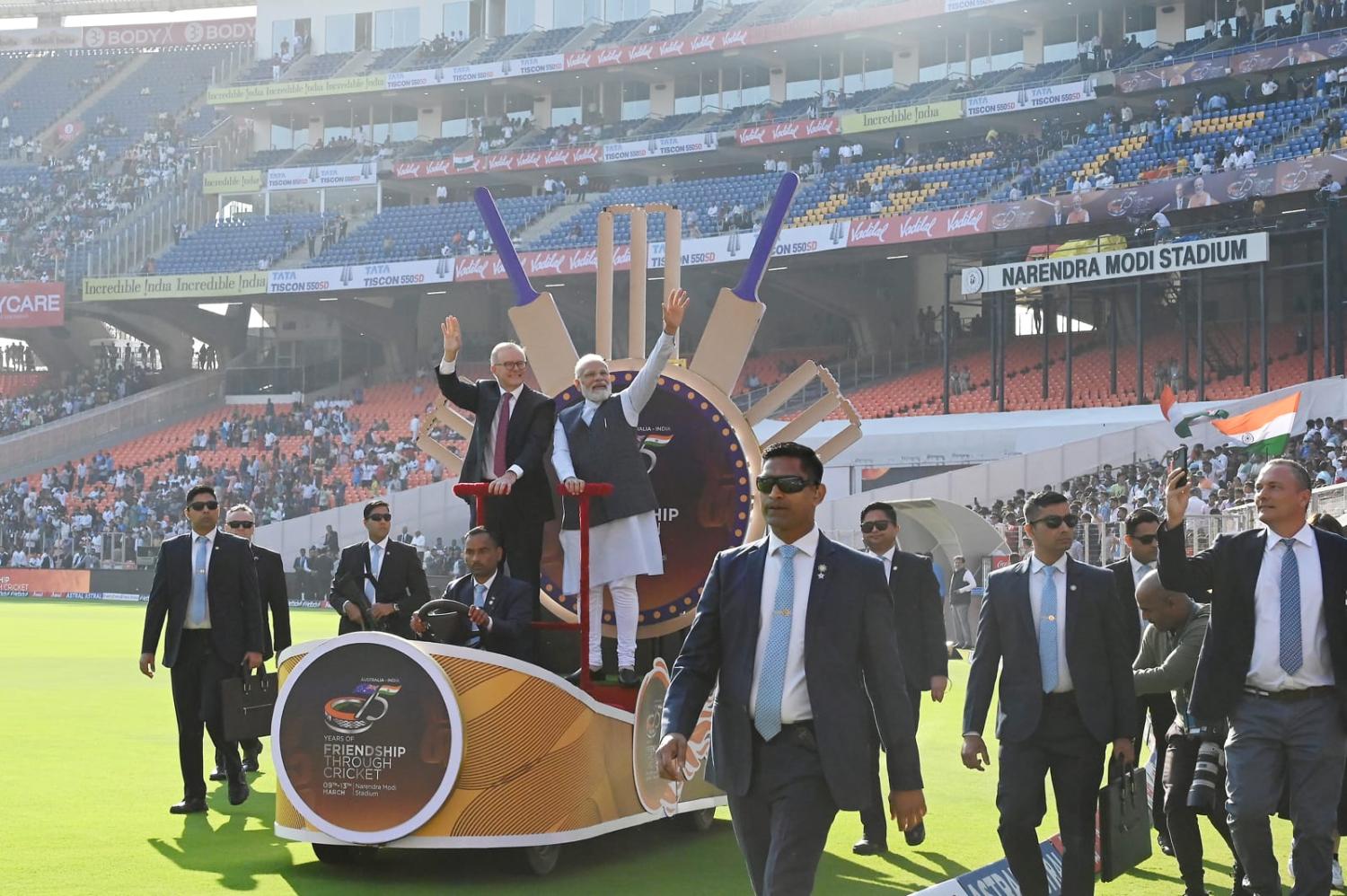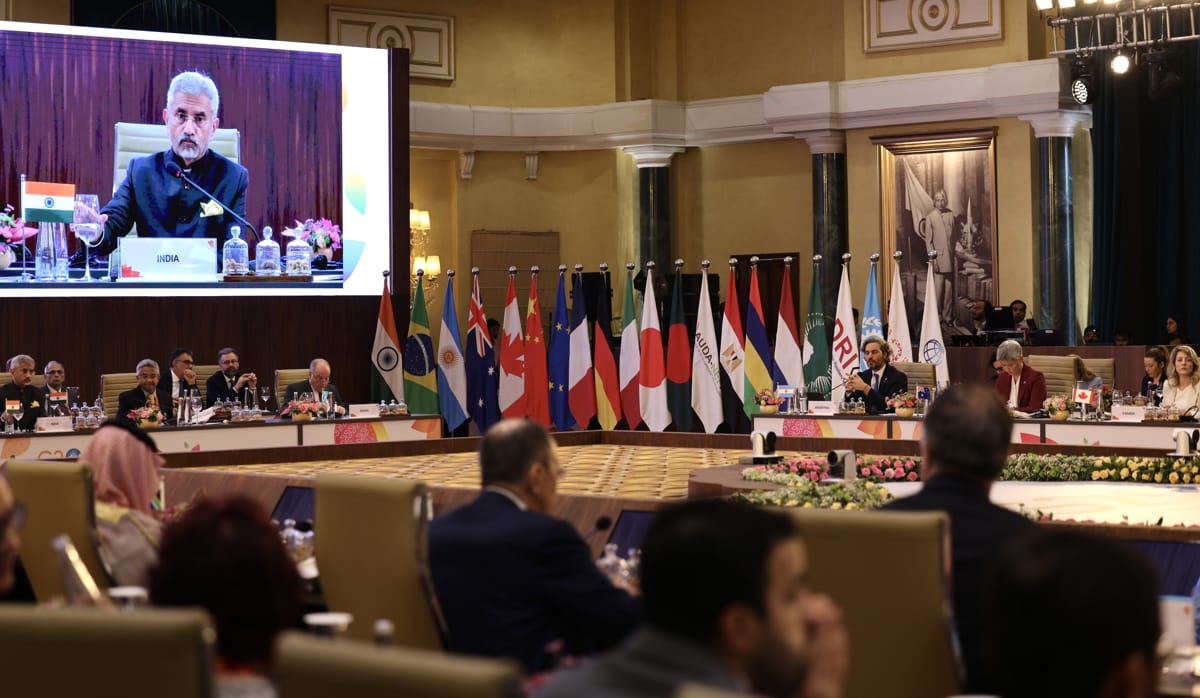BENEDICT COLERIDGE

Over the last few weeks Australia’s newly intimate diplomatic relationship with India has been on full display. The “Raisina at Sydney” component of the 2023 Raisina dialogues was quickly followed by the G20 foreign ministers’ meeting and the main Raisina event in New Delhi, and now by Prime Minister Anthony Albanese’s trip to India, given vociferous support in Deputy Prime Minister Marles’ celebratory presentation to parliament. At time of publication, Albanese is in Ahmedabad (scene of the grievous 2002 communal violence), ushering in the new relationship at that great monument to personalist politics – the vast Narendra Modi stadium.
In the government pronouncements to date on these interchanges, little has been said amid the toasts to friendship, cricket and “comprehensive strategic partnership” about developments within India that bode ill for press freedom, the rule of law, constitutional integrity and the architecture of equal citizenship. When quizzed, Foreign Minister Penny Wong did concede last week to having raised human rights issues with her Indian counterpart, but relied on the familiar defence not “to go through chapter and verse what’s discussed” in public. This general accommodation appears based upon the calculation that the obvious strategic and economic convergence between Australia and India, driven by pressing regional circumstances, demands reserve on these issues. It’s also a dynamic that expresses a shifting power dispensation, with India offering alternate labour markets, defence collaboration and strategically complementary diplomatic heft.
Australia ought to be considered in our reception and repetition of the Modi government’s talking points while also developing public messaging more layered than “cricket and Holi”.
The question, though, is whether in seeking a serious, sustainable and mature relationship, we’re ultimately well served by the public narrowing of our intentions to a thematically simple formula – “Cricket! Democracy! Mates!” Is our understanding of India being outstripped by our enthusiasm for fast-tracked intimacy? And if so, are we naively entangling ourselves in, and giving tacit support to, domestic Indian ideological developments that diverge widely from our own principled commitments?
In a world of communicative immediacy, intensified migration and closer inter-societal ties, foreign and domestic politics have been made continuous. That’s to say that foreign policy becomes inseparable from domestic political interests and agendas. Interests are pursued through social opinion and will formation in addition to the usual relationships between elite actors and across governmental agencies. Developmental narratives articulated in international fora are redirected towards domestic audiences, affirming certain political presuppositions or ideological tendencies. In this context, Australian policymakers will find it difficult to speak seriously about India’s regional role without touching upon its internal politics. It would be better that they do so reflectively rather than inadvertently.
 Indian Foreign Minister Subrahmanyam Jaishankar during the G20 Foreign Ministers Meetings in New Delhi this month (Sarah Friend/DFAT)
Indian Foreign Minister Subrahmanyam Jaishankar during the G20 Foreign Ministers Meetings in New Delhi this month (Sarah Friend/DFAT)Let’s take an example. At the recent Quad foreign ministers panel session at Raisina Dialogues in New Delhi, Wong was invited to reflect on India’s role in the “Indo-Pacific” region. In the course of her reflections, she cited approvingly Indian Foreign Minister Subrahmanyam Jaishankar’s familiar line that “India is a civilisational state” (Wong adopted the phrase “civilisational power”) and is therefore qualitatively different from small culturally composite and marginal states in the region.
At one level this statement seems unexceptionable, testifying to the reality that the modern Republic of India is a vast empire-scale entity encompassing historically disunited territories and undergirded by diverse cultural lineages stretching back to the early Vedic period. But, as employed by Jaishankar and received within contemporary Indian domestic politics, the phrase bears additional meaning. The concept of the civilisational state suggests that modern Indian statehood is indexed to a static and unitary civilisational formation, an account of which is readily supplied by the historically illiterate but currently idealised notion of a “Hindu Rashtra”. The Indian subcontinent is, of course, one of the most pluralistic regions in the world, its living social reality defined by the intermixture of religious and ethical traditions. The “civilisational state” framework compresses the tangled web of Indic, Persianate, Indigenous, European and post-colonial Anglophone influences into a simple narrative vehicle for chauvinistic identity consolidation.
What’s more, the “civilisational state” concept isn’t straightforwardly consonant with the constitutional state concept. Of course, constitutionalism is itself a living cultural commitment and, in the Indian setting, the ideals and modes of agency sponsored by the constitution interweave with the textures of ordinary life, becoming a source of cultural formation. Still, in Jaishankar’s formulation, the constitution, as a secular statement of foundational, cross-culturally shareable, principles, is placed under pressure by the integrative ideal of civilisational unity. Modern constitutions integrate by principle rather than uniformity of cultural self-understanding. In contrast, Jaishankar’s set piece phrase weds state cohesion to an ideologically simplified portrait of Indian ethical culture and historical experience before which many, particularly India’s large Muslim minority, may pause warily (to say the least).
It’s clear enough that a more intimate Australia-India relationship is vitally in Australia’s interest. It’s also clear that the Republic of India ought to be approached with the kind of respect that avoids reduction and countenances its true internal diversity. To be credible and mature in this partnership – to be taken seriously as interlocutors – means to exhibit a more obvious familiarity with India’s domestic politics and the meaning of certain formulations in this setting.
To this end Australia ought to be considered in our reception and repetition of the Modi government’s talking points while also developing public messaging more layered than “cricket and Holi”. Ian Hall suggested this week in The Interpreter that Australian MPs and policymakers quite simply do not know enough about India. More broadly, I would suggest that for too long Australian policymakers have tended to think in methodologically secular, structural and commercial terms, leaving them hamstrung when faced with intensely religious, internally multivalent, societies in which the constitutional state negotiates for social authority with deeply inlaid devotional cultures and political ideologies.
Engaging across the Indian Ocean with a mega-state undergoing deepening social rifts along identarian lines requires some level of well-informed caution.
No comments:
Post a Comment